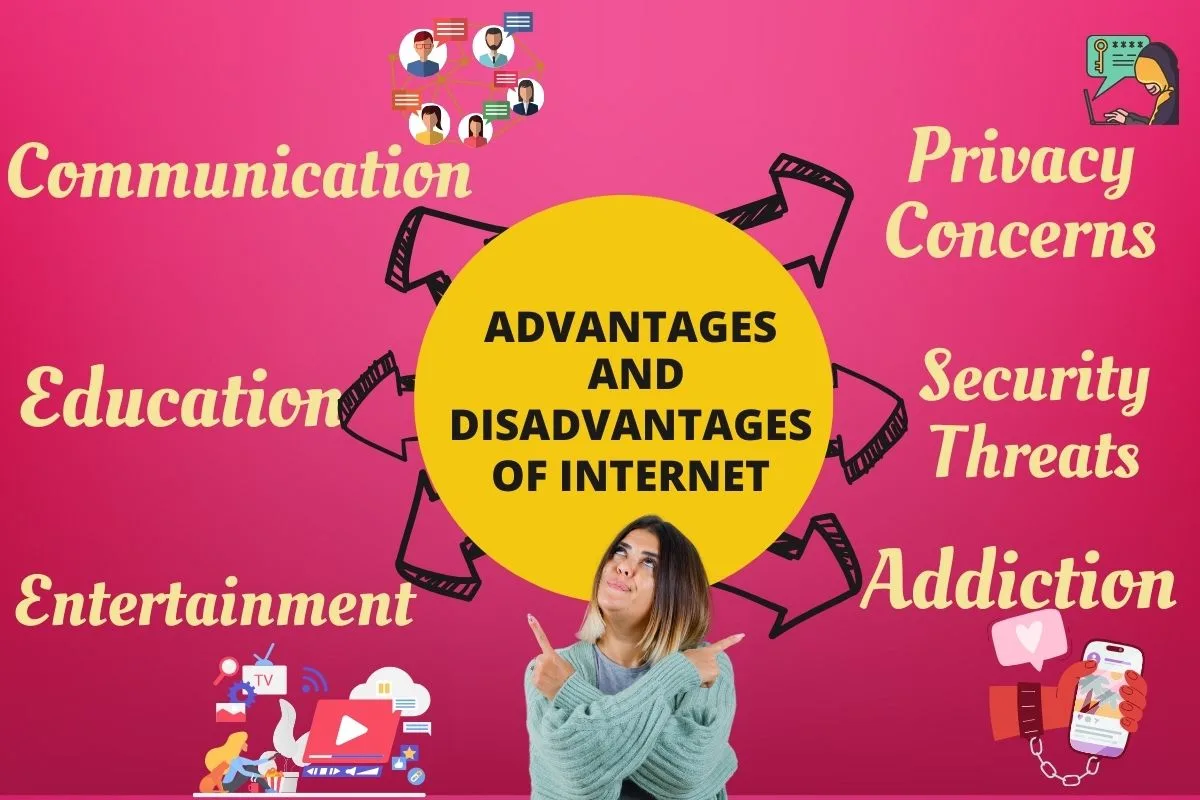The Internet has revolutionized the way we communicate, access information, conduct business, and entertain ourselves. However, like any technological advancement, it comes with both advantages and disadvantages.
Advantages of the Internet
- Access to Information:
- The Internet provides unparalleled access to a vast repository of knowledge from diverse sources such as academic journals, encyclopedias, news websites, and educational platforms like Khan Academy and Coursera.
- Users can quickly find information on almost any topic, empowering them to learn new skills, pursue academic interests, and stay updated on current events.
- Communication:
- Online communication tools such as email, social media, and messaging apps enable real-time interaction and collaboration among individuals, regardless of their location.
- The Internet has revolutionized long-distance communication, allowing people to stay connected with friends, family, and colleagues around the globe at minimal cost.
- Convenience:
- E-commerce platforms like Amazon and eBay offer unparalleled convenience by allowing users to shop for a wide range of products and services from the comfort of their homes.
- Online banking and payment systems facilitate secure and efficient financial transactions, eliminating the need for physical visits to banks or payment centers.
- Education:
- Online learning platforms provide access to high-quality educational resources, courses, and tutorials, making education more accessible and affordable for people worldwide.
- Distance learning programs offered by universities and institutions allow students to earn degrees and certifications remotely, accommodating those with busy schedules or limited access to traditional education.
- Entertainment:
- Streaming services such as Netflix, Hulu, and Spotify offer a vast library of movies, TV shows, music, and podcasts for on-demand entertainment.
- Online gaming communities provide opportunities for social interaction and immersive gameplay experiences, fostering connections among players from diverse backgrounds.
- Global Marketplace:
- E-commerce has democratized access to the global marketplace, allowing small businesses and entrepreneurs to reach customers worldwide without the need for physical storefronts.
- Online marketplaces like Alibaba and Shopify provide tools and resources for businesses to establish an online presence and sell products to a global audience.
- Job Opportunities: The Internet has created new avenues for employment, including freelance work, remote jobs, and online entrepreneurship. Platforms like Upwork, Freelancer, and Fiverr connect businesses with freelancers, enabling flexible work arrangements and income opportunities.
- Collaboration and Networking: Online collaboration tools such as Google Workspace, Microsoft Teams, and Slack facilitate teamwork and communication among colleagues, allowing for seamless collaboration regardless of physical location. Social media platforms like LinkedIn also enable professionals to network and connect with potential employers or business partners.
- Access to Entertainment and Cultural Diversity: The Internet provides access to a diverse array of entertainment options, including movies, TV shows, music, literature, and art from around the world. Streaming services, online forums, and digital archives make it easy for users to explore different cultures and artistic expressions.
- Political and Social Activism: Social media platforms have become powerful tools for political mobilization, social activism, and grassroots organizing. Movements like the Arab Spring and Black Lives Matter have utilized online platforms to raise awareness, coordinate protests, and effect social change.
Disadvantages of the Internet
- Information Overload:
- The sheer volume of information available online can be overwhelming, making it difficult for users to sift through and evaluate the credibility of sources.
- Misinformation, propaganda, and fake news spread rapidly on social media platforms, leading to confusion, polarization, and distrust in traditional media sources.
- Privacy Concerns:
- Personal data collected by websites, social media platforms, and online services may be exploited for targeted advertising, surveillance, or unauthorized access by third parties.
- Data breaches and security vulnerabilities expose users to the risk of identity theft, financial fraud, and other forms of cybercrime.
- Cyberbullying and Online Harassment:
- The anonymity afforded by the Internet can embolden individuals to engage in cyberbullying, trolling, and harassment, causing psychological harm to victims and disrupting online communities.
- Social media platforms often struggle to effectively moderate and address abusive behavior, exacerbating the problem of online harassment.
- Addiction:
- Excessive use of the Internet, social media, and online gaming can lead to addiction-like behaviors, characterized by compulsive use, withdrawal symptoms, and negative impacts on mental health and well-being.
- Internet addiction may interfere with daily responsibilities, relationships, and academic or professional performance, requiring intervention and treatment.
- Digital Divide:
- Disparities in access to technology and Internet connectivity create a digital divide, perpetuating inequalities based on socioeconomic status, geography, and demographics.
- Those without reliable Internet access are at a disadvantage in terms of education, employment opportunities, and access to essential services such as healthcare and government resources.
- Security Threats:
- The Internet is rife with security threats such as malware, ransomware, phishing scams, and distributed denial-of-service (DDoS) attacks, posing risks to individuals, businesses, and critical infrastructure.
- Cybersecurity measures such as antivirus software, firewalls, and encryption are essential for mitigating these threats, but many users lack the knowledge or resources to adequately protect themselves online.
- Online Predators and Exploitation: The anonymity of the Internet can facilitate predatory behavior, including grooming, exploitation, and trafficking of vulnerable individuals, particularly children and adolescents. Social media platforms, online chat rooms, and gaming communities are often targeted by predators seeking to exploit unsuspecting victims.
- Information Manipulation and Propaganda: The Internet is susceptible to manipulation by state actors, extremist groups, and special interest organizations seeking to spread propaganda, misinformation, and disinformation. Fake news, conspiracy theories, and viral hoaxes can undermine trust in democratic institutions and public discourse.
- Dependency and Technological Disconnect: Overreliance on the Internet and digital technology can lead to a disconnect from the natural world, face-to-face interactions, and offline experiences. Excessive screen time and digital distractions may contribute to social isolation, attention deficits, and a diminished sense of empathy.
- Environmental Impact: The proliferation of Internet-connected devices, data centers, and electronic waste has significant environmental consequences, including energy consumption, carbon emissions, and resource depletion. The production and disposal of electronic devices contribute to pollution, habitat destruction, and ecological degradation, exacerbating climate change and environmental degradation.
- Censorship and Content Regulation: Governments and corporations may censor or restrict access to online content deemed objectionable, offensive, or politically sensitive. Internet censorship laws and content moderation policies vary widely across countries and platforms, leading to concerns about freedom of expression, digital rights, and online censorship.
- Health Concerns: Excessive screen time and sedentary behavior associated with Internet use can have adverse effects on physical and mental health, including obesity, poor posture, eye strain, sleep disturbances, and depression. Cyberbullying, online harassment, and social comparison on social media platforms can also contribute to negative psychological outcomes, such as low self-esteem and body image issues.
Conclusion
In conclusion, while the Internet offers numerous benefits and opportunities, it also poses various challenges and risks that must be addressed through responsible usage, regulation, and cybersecurity measures.

